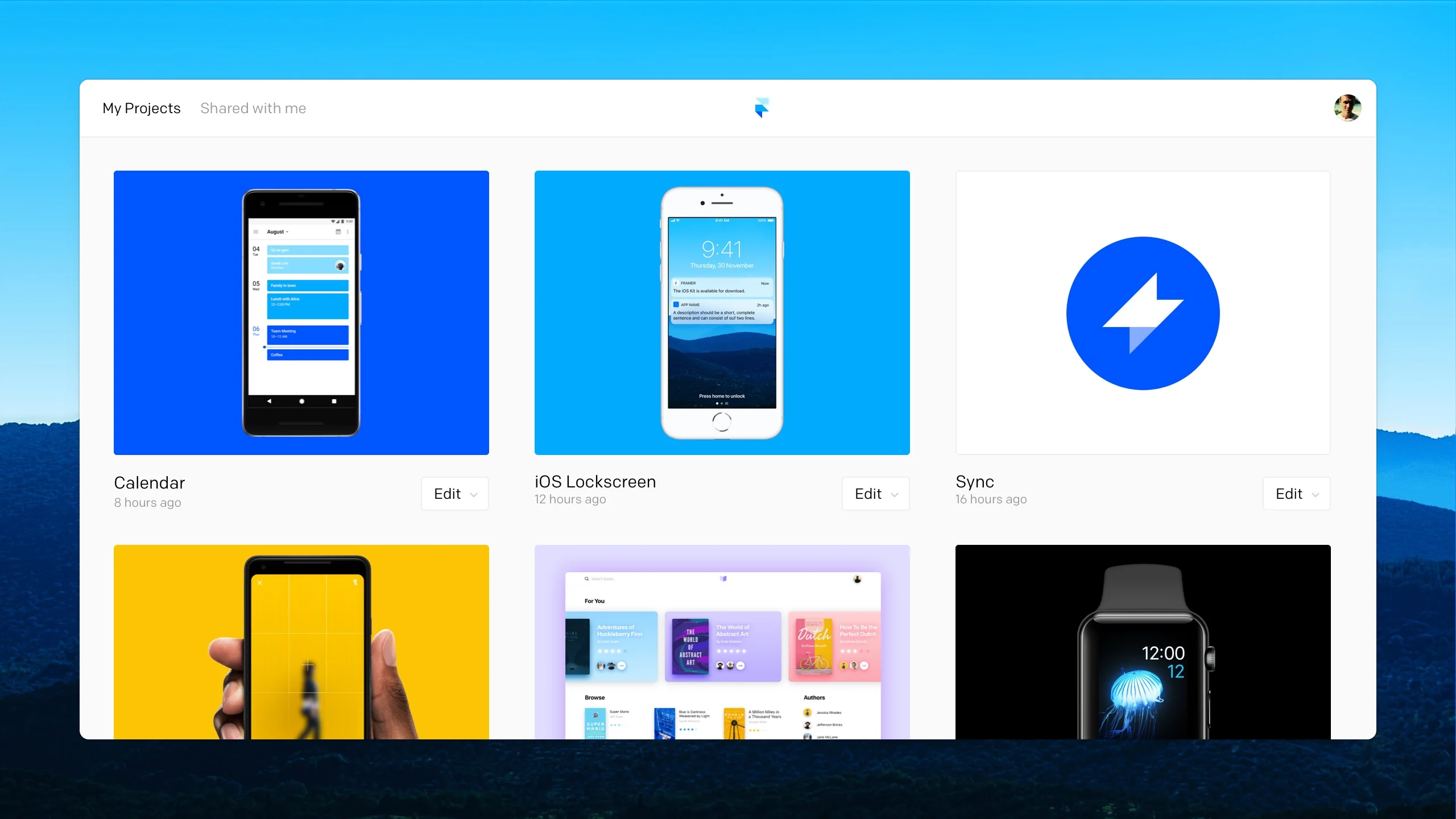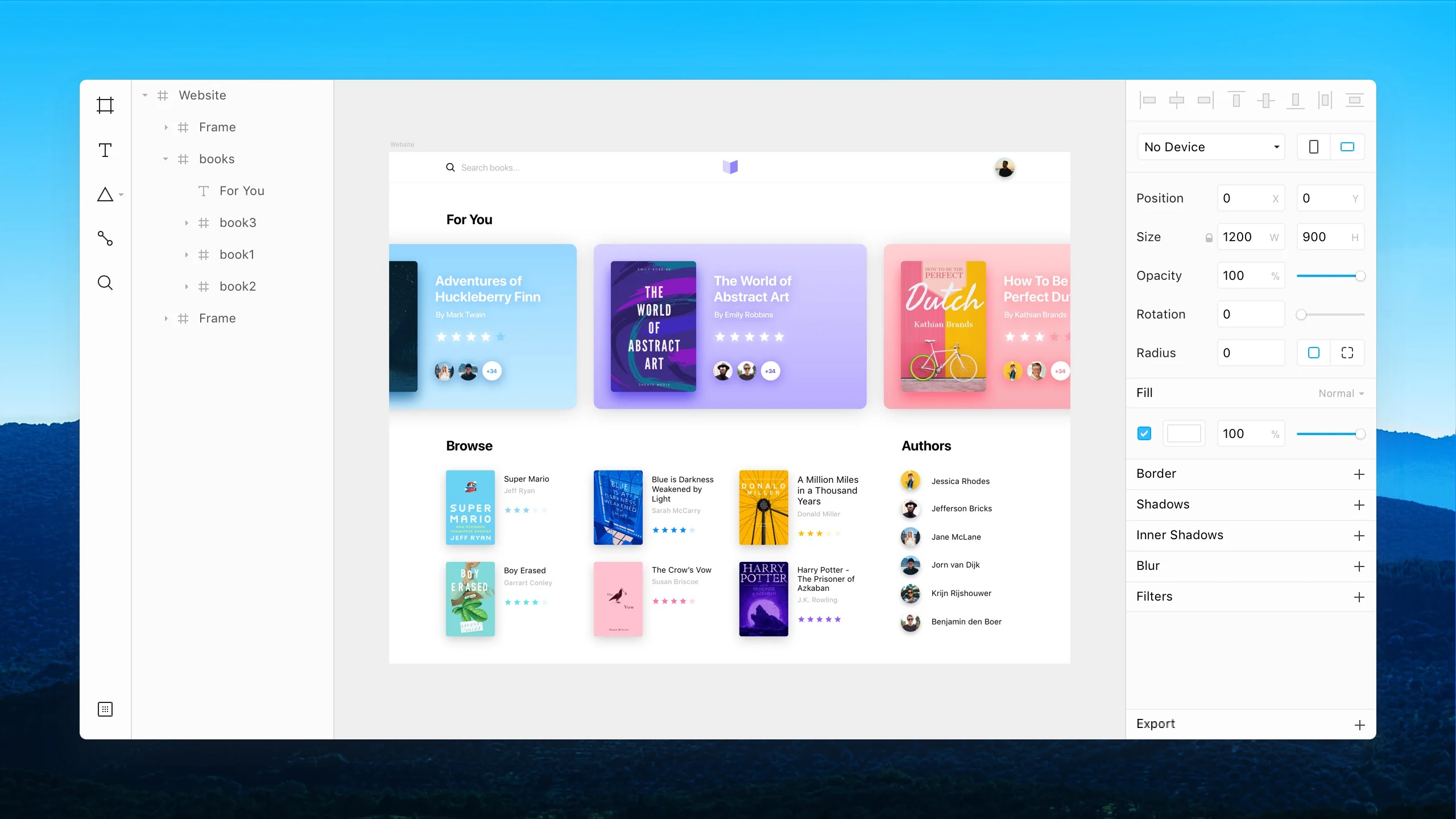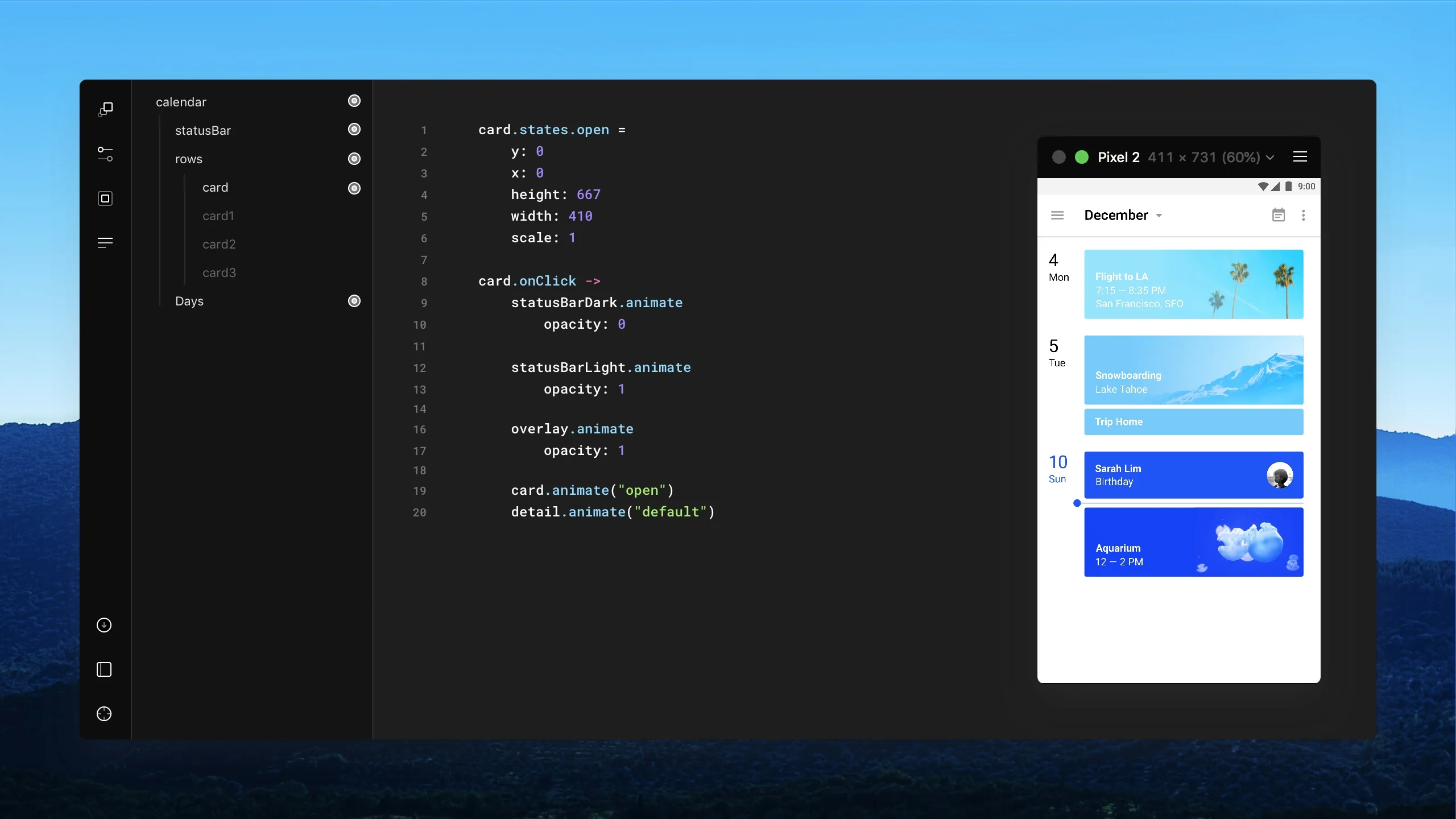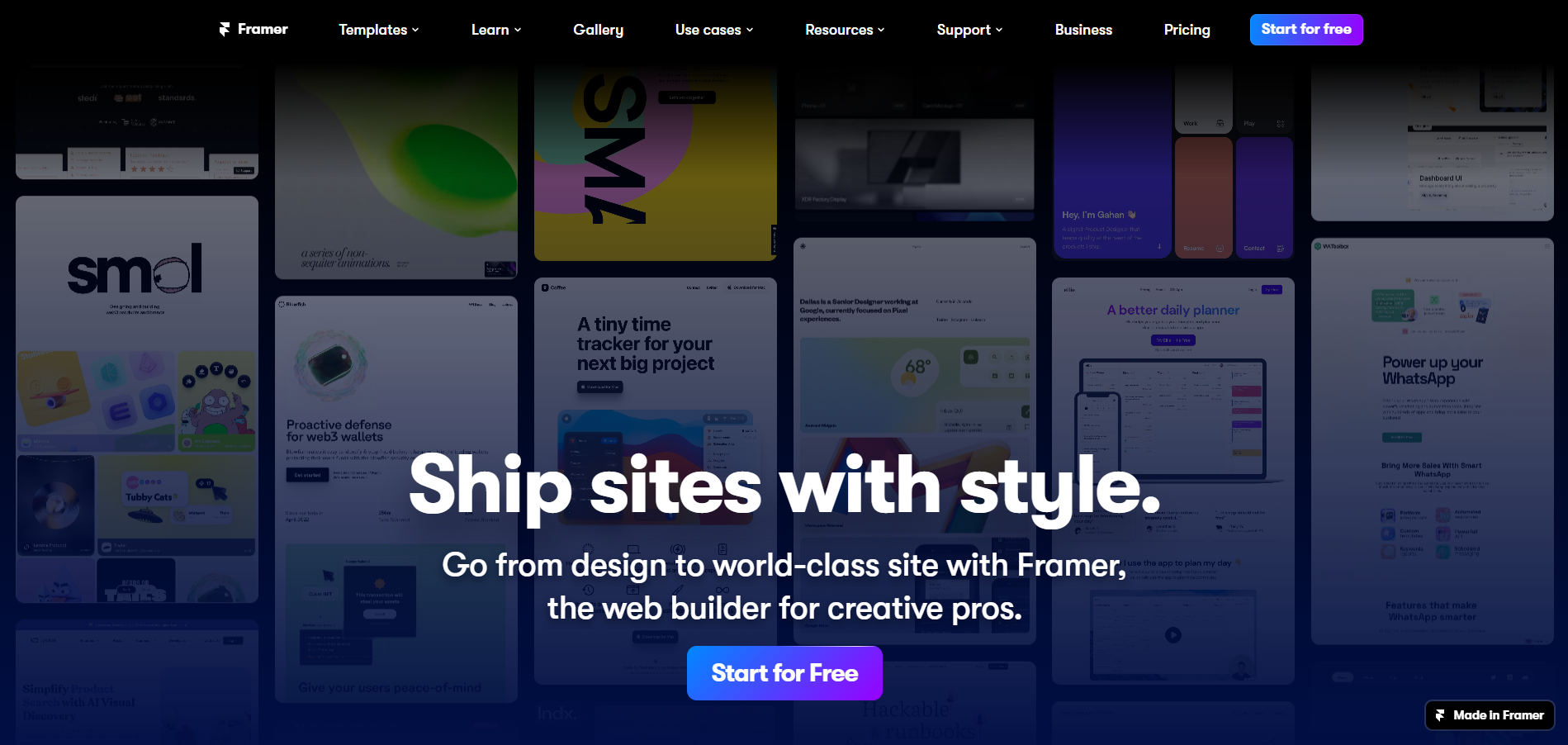

Framer Reviews & Product Details
Framer is a design tool for web designers and developers that lets users create production-ready code. Armed with basic coding knowledge, Framers has tools that can create animated effects, build UI components and tap into code libraries, UI kits, or packages. Framers also support typescripts. With Framer, you get a lot of creative freedom, features a cursor chat, a rapid code editor, Spotify integration, as well as Sketch, Figma, iOS, Photoshop, and more.


| Segment |
|
|---|---|
| Deployment | Cloud / SaaS / Web-Based, Desktop Mac |
| Support | 24/7 (Live rep), Chat, Email/Help Desk, FAQs/Forum, Knowledge Base, Phone Support |
| Training | Documentation |
| Languages | English |
Framer Pros and Cons
- You get a lot of creative freedom
- Framer is available on multiple platforms, and any device running a web browser
- There are a range of different integrations available, including Sketch, Figma, iOS, macOS, Photoshop, and more
- It’s great for prototyping
- Some users have complained about buggy updates
- To take full advantage of Framer, you’ll need some coding know-how
- It lacks some sought after features like text style, which comes with competitors like Sketch





Framer is easy to use and awesome tool for desinging creative websites in a matter of minutes. Its integration with Figma allows us to copy paste our Figma designs into Framer.
Framer is awesome tool but miss few modern features
Framer allows us to design creative websites in a metter of minutes
Framer is a easy to use and a fantastic tool to design creative websites with no hassle. It's figma inntegration is super awesome which alows uus to copy paste figma designs into framer.
Framer is super fantatsic but sometimes it is hard to implement few designs for beginners as compared to othr tools.
Framer helps us to roll out creative websites for our cllients.
As a UX/UI Designer heavily involved in product prototyping, Framer has been an indispensable tool in my arsenal. What stands out most about Framer is its robust set of features, especially its ease of creating interactive prototypes. The ability to seamlessly transition from design to code using its intuitive interface is a game-changer. The wide array of pre-built components and the flexibility to create custom ones have significantly expedited my prototyping process, enabling me to explore various design possibilities efficiently.
One aspect that could be improved upon is the learning curve for beginners. While Framer offers extensive functionalities, it might be slightly daunting for newcomers or those transitioning from other design tools. Additionally, certain advanced features might require a bit more documentation or tutorials for users to fully harness their potential.
Being able to create complex animations and micro-interactions effortlessly has allowed me to bring my designs to life, providing stakeholders and clients with a tangible feel of the end product. The real-time collaboration features have also streamlined teamwork, facilitating smoother interactions and feedback exchanges among team members, regardless of their geographic location.
The speed to deliver or have an awesome site online and live with no much coding work and not many resources involved.
Still..some technical knowledge is needed. Not a "dislike" i guess but there's a limitation in terms of who can use the tool effectively and get really impactful results.
We are capable of having landing pages and sites quick, put them live in no time and able to validate business models faster. Also building landing pages and websites faster for clients that need speed and quality on the output.
From a practical standpoint, I love the ability to use the latest and greatest widgets, code snippets, npm packages (on github, codepen or sandboxes anywhere) in my designs and prototypes. From the standpoint of design systems and prototyping, once you get your head around its way of working, it gradually improves the fidelity of your designs in handoff to production (if you take the time to work with and understand flexbox and CSS properties). It took us about a year to fully transition from Sketch, Zeplin and Abstract. Along the way you come up many ways to use production code in your design system and vice versa. It gets your dev team collaborating with designers better, as each are learning to speak the other's language (a lot more than before) No coding is required to put Framer into practice, but there is a learning curve (as you might expect with a transition to anything new - Figma, Marvel, Webflow, Invsion, etc) there will be some tradeoffs likely with your existing workflow. I feel I am better for the learning curve, as I now understand responsive web design and the capabilities of CSS / React far better and ultimately the process adjustments have resulted in massive time savings and efficiency. I actually look forward to my job each day exploring the endless extensibility of React in Framer to improve our design process and productivity.
They have made ventures into adjacent markets like CMS, Web Publishing and Animation, which are very much welcomed... but without completing core needs to establish Framer as a designer's tool of choice. My hit list would be: better component library management, design systems (for large scale sites) across projects, teams, and sites, and, icon library integrations. A generic icon component the user could set up themselves without code would be most ideal. SVG and support for basic editing is very limited.
Framer tries to solve many problems. It solves prototyping 100%, design systems 80%, interaction design 100%, graphic design 50%. Once you have a design system in place, it helps us quickly deliver hi-fi mockups of new features to teams internally. Having a prototype for support, sales and end users to play with helps attract and retain customers in an enterprise setting, and keeps the conversation and feedback rolling.
I love how easy it Is to use. Every element has been has been thought out with original ways to abstract problems other no code websites make very difficult to work with.
Still has work to expand on the full capabilities that Webflow has since there are abstractions made in Framer.
I'm using it for all web design prototyping and publishing.
You can create fantastic websites with a lot of previously designed patterns, that help you to do awesome designs and trasitions that would take hours to make for people who don't have code knowledge.
I think that it would be very helpfull to have a complete access to the code and could share it with the developer. Also they have to improve the relationship between figma and framer.
They are solving graphic designers life with this software, we not necessarily need to know about code, and this program makes it very easy, and don't limit our creativity.
Framer has been really easy to use, but the experience has been exponentially rewarding. As with any tool, there is a learning curve but for those with experience in Figma, it'll feel rather similary with Framer.
Some minor bugs experienced from time to time but nothing that effects my work on Framer.
Framer has allowed me to design and publish websites at ease without the need for any major coding skills.
Framer is the perfect tool for anyone looking to go from 0-1 with their website regardless of experience level. Their interface, YouTube tutorials, and community makes learning both basic and more advanced features a breeze.
There is nothing for me to dislike about Framer, but since they recently pivoted to a web design tool, they're a relatively new product. Because of that, there are some features missing, but I also know that they're working hard and shipping updates like no other company. So whatever I, or any other designer in their community is missing, I'm sure will be adressed soon enough.
Framer let's me design freely on their canvas as if I was designing something in Figma or any other design tool with the exception that the design can be published to a live domain at the click of a button. No hassle importing design over from other tools, even though that's also easily done should you prefer such a workflow.
The ability to quickly create custom components for unique experiences. Out of the box speed and optimisation that framer does on the background. And ability or import designs from Figma.
Their CMS tool is great but is lacking. Also roles and permissions need to be updated I want to invite guests to only edit CMS nf that would mean paying for an entire editor.
Creating beautiful functional websites that are fast and easy to publish. Ability to finish sites faster than with other tools once you get the hang of it.
Framer has a very intuitive and designer friendly interface. This makes you get used to the workbench in very few hours. In addition, the way in which interactions are performed, is undoubtedly the best thing about it. Its components or its effects... are VERY VERY simple to use and not at all hard to work with.
I can't say anything negative about the platform right now. You have to be realistic. Even though the software is not even 3 years old, they have been able to GIVE what people are asking for. They treat their customers like I have never seen before! As the months go by they will be perfecting the platform more and more.
Framer, in my opinion, solves two big problems in web development. 1. Code. No code opens the doors to a totally open world. 2. It has brought back, through its community and its platform/interface, the real fun of web development.
The incredibly control you have over everything in a drag and drop interface makes it fun to create for the web again. It's also incredibly quick to go from idea to fully built website in an afternoon!
Rarely anything. Perhaps that the product is still so young that it lacks some features but those are all being taken care of every week with incredible updates.
It gives me a way to build a site without worrying about code. This lets me share my ideas with the world without much investment or time dedicated to them! What more could I ask for?
Framer offers an unparalleled design experience with its seamless integration of design and development. It's user-friendly, efficient, and promotes creativity, making it an essential tool for anyone looking to quickly bring their ideas to life.
I don't have any particular dislikes about Framer. However, it could further enhance its capabilities by improving the data handling for exporting and importing data within the CMS. This would streamline the process and make the tool even more powerful.
Framer bridges the gap between design and development, providing a one-stop solution for creating beautiful websites without the need for coding expertise. It has empowered me to realize my designs faster and with more control, significantly reducing development time and effort.
Framer enables designers to create advanced web designs fast, and get them published in no time. It has a lot of sophisticated features in a very clean and intuitive UI. Easy to learn and powerful in its capabilities.
At the moment, the CMS has some limitations when it comes to using it for blog posts with multiple inline media in the post content. But at the pace of great quality updates that the company is making to the platform, this should become a non issue anytime soon.
I am moving my business website and all marketing pages from WordPress to Framer. The ability to quickly set new pages, design new layouts, keep consistency throught the website, publish changes quickly... is magnificent. Though the transition implies a lot of work in recreating pages previously in WP, the time that will be saved in the future and the ability to enhance and revamp the design is worth the effort.
I have tried different web creation platforms throughout the last few years and Framer is a place where I feel most confident and capable while creating websites from scratch. I feel like the possibilities there are endless and everything that I can think of regarding design solutions can be made without having to know how to code. On top of that, Framer has the best community of designers that are supporting each other on social media and the library of various remixes and templates keeps spreading like a storm. What a place to bring my ideas to reality. Big up, Framer!
Until now, I have not found anything that I would dislike.
Giving every business an easy and quick solution to have a modern and intuitive online presence that showcases their offer or tells their story in the best way possible.
Some of the outstanding aspects of Framer: 1. User-Friendly: Particularly accessible if you're already familiar with Figma, making it intuitive to use. 2. Sleek UI: The interface boasts a clean and modern design. 3. Regular Substantial Updates: Framer consistently delivers substantial updates on a weekly or bi-weekly basis. 4. Effortless Animation and Distinctive Designs: Crafting animations and distinct designs is remarkably simple. 5. Pioneering the Future of Website Design: Framer appears to be at the forefront of shaping the future of website design.
I wish I could make my own categories so I can sort my projects based on categories.
A few to mention 1. I don't need to waste hours and hours on prototyping in Figma and then go into development, I just do it all in Framer 2. SEO & Speed are amazing 3. Extremely easy for clients to make changes on their own
Using Framer has made designing, building, and publishing websites so much easier and faster! Framer's unique approach to a visual canvas-based editing workflow is a huge improvement over other website building tools. Framer delivers new additions, improvements, and bug fixes very quickly, with updates almost every week. The Framer team and community are also very helpful and responsive when you're running into issues or need help. I don't think I could go back to building websites with code after experiencing the speed and quality of Framer!
Framer's CMS is lacking many features that are common in other CMS software. Reference fields, an API for interacting with the CMS externally, and advanced sorting options are a few features that would make Framer's CMS more powerful but are currently missing.
Framer brings the design, building, publishing and hosting processes into the same place. There's no need to jump between different design tools, code editors, CMS tools and hosting platforms as Framer handles all of those things.
"I find Framer to be practical, incredibly fast, and extremely user-friendly! When comparing it to its competitors, I am convinced that Framer is exceptional, and the websites constructed using it go live remarkably quickly. Despite having experimented with alternatives like Webflow and WordPress, I am genuinely of the opinion that Framer distinguishes itself through its ease of use and rapid website creation, yielding beautifully designed components."
I like everything Framer delivers, I wouldn't have any comments to make! Some things I would add might be to handle SVG files better and insert the multicolor gradient.
In web design the biggest benefit is agility and simplification for my creations! As for prototyping, the Canva tool is sensational and I just think they could come back with plugins to get even better.
Framer has helped me transition from primarily being a miserable web developer, to an excited and motivated designer. With the ability to continue working with clients as a "developer" via the seamless no-code editor and interactions, as well as being built on top of React - giving developers the ability to create custom components and overrides. The transition period from Figma to Framer was days. Framer lets you build & ship QUICK. When it comes to updates & hotfixes the Framer team is ON IT! They fix issues quickly and understand their community is what matters the most. Framer is one of the most engaging communities on Social Media and their forums, which truly makes me a huge supporter of this product.
Framers no-code editor is constantly growing. This means that naturally there are bugs and support issues at this stage. One of the main "annoyances" that I've experienced with others is that when you submit a template to the marketplace and are rejected, you're given a checklist of possibilities as to why you were denied, rather than a small list of reasons. While I understand Framer is still new and they get dozens of templates daily it's slightly annoying to resubmit, potentially wait 2 weeks, then get the same email of rejection without any direction.
Framer has solved one major problem for me. The transition from developer to designer. Without Framer, I don't think I would've made this transition so seamlessly while still retaining web clients - with the potential to migrate them over to Framer in the near future. Being able to create quick prototypes and animated social media content is absolutely wonderful as well!
Very similar to Figma in many ways, but you end up with a fully built website. Offers a lot of flexibility as well as built-in components to help you get started. Works great out of the box and there are hardly ever any bugs on different devices. Great for no-code starters that want to ship something fast without compromising on quality.
I'm confident more and more features will be released, to allow more complex login, user management, maybe even subscriptions at some point. You can still do it via third party platforms, but would be nice to have it all in one place. Right now the only "big" bug is related to importing templates and CMS items into new projects, which is where Framer kinda hits its limits, but again I think this will be solved... AI stuff is a joke for right now, don't count on it.
Speed of delivery. Easy to use interface, Easy to manage CMS. Full control over animation and every detail related to my projects. Pre-built components that you can just copy/paste in.









